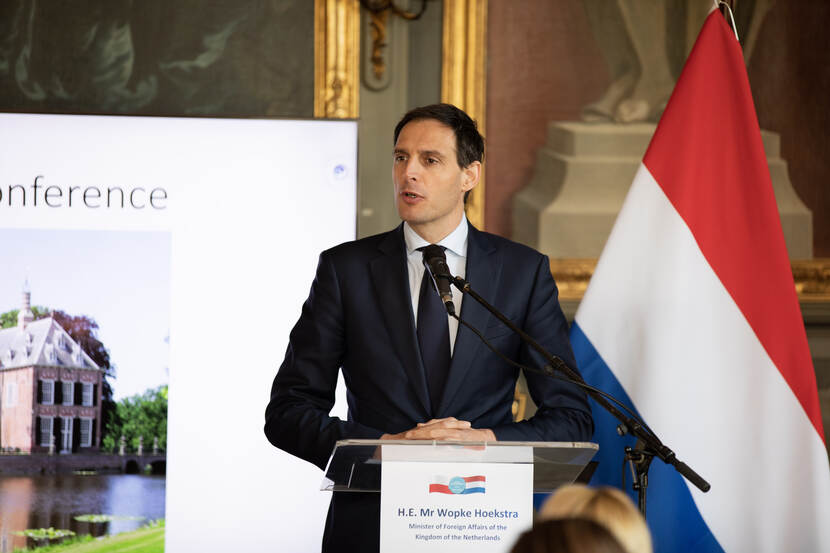Minister Hoekstra: 'The only effective response to the war in Ukraine is a joint response'
Speech by Wopke Hoekstra, Dutch minister of Foreign Affairs, at the 31st Utrecht Conference, 20 april 2022.
Good morning everyone!
Thank you minister Rau for taking the time to be here. And for bringing so many people with you. Including staff from the Dutch embassy in Warsaw. I hope you all enjoyed a wonderful Easter weekend.
For over three decades now St Peter’s Square has been decorated with a beautiful sea of Dutch flowers, every time Urbi et Orbi has echoed from the balcony. A tradition we owe to the Polish Pope John Paul II. The first non-Italian Pope since the Dutch Pope, Adrian VI, 450 years earlier.
‘Dank voor de bloemen!’
Thank you for the flowers.
With those simple words Pope John Paul II created this wonderful tradition. But this weekend, I reflected on something else this Pope once said: ‘peace will be the last word of history’. And although the ‘last word’ cannot by definition be a recurring tradition, it’s still an uplifting thought to sustain us at this difficult time.
This Easter holiday, I was also reminded of another Polish tradition: hospitality. ‘A guest in the house, God in the house,’ as the Polish saying goes. Poland is accommodating 2.7 million refugees and is also playing an important role in delivering humanitarian aid to Ukraine. Meanwhile, many Polish citizens have opened up their homes and hearts to Ukrainians fleeing their country. For this generous response they deserve our deepest respect.
Today, we share a common conviction: the illegal and unprovoked war in Ukraine must end. Together we are putting pressure on the Russian government and limiting the resources the Kremlin has at its disposal to wage war. By cooperating closely on sanctions packages, isolating those responsible for the illegal invasion of Ukraine, and making sure illegal actions have a cost. The crimes that are being committed must not go unpunished. Impunity is not an option. That’s why we are collecting evidence and identifying perpetrators, and we will eventually hold them to account.
For 31 years, Poland and the Netherlands have been coming together to discuss our mutual cooperation, and where possible coordinate our shared standpoints. This conference is important every year. But this year more than ever. Because the only effective response to the war in Ukraine is a joint response. A response founded upon shared values. Our democracy, the rule of law and freedom. Our humanity. Our belief that problems are best solved together.
Today, that response has a prominent place on the agenda. The focus of all five tables is on achieving even better cooperation between our countries. When it comes to our security and defence. And how we as NATO partners must continue to stand shoulder to shoulder. When it comes to EU external policy. And how EU-China relations should be shaped in the years to come. When it comes to climate and energy. And how to end our dependency on Russian gas. And when it comes to leveraging our greatest strength. Our economic weight.
The war in Ukraine underlines the importance of a strong and unified EU. If we want to be effective on the global stage, it is imperative we operate as one. Ukraine is bravely defying Russian aggression. It is fighting for a democratic future where civil liberties and human rights are upheld. We in the EU must demonstrate the importance of upholding these rights and liberties. And continue to stand up for our democratic values and for the rule of law.
Ladies and gentlemen,
We are meeting for the thirty-first time. But our relationship goes back much further. To the Second World War, when Polish soldiers helped liberate the Netherlands. For that, we will always owe a debt of gratitude. And to previous centuries.
Our history is so rich that we could spend all morning reciting wonderful stories. And poems. You might not have known this, but in the seventeenth century, the Netherlands and Poland regularly practised diplomacy through poetry. I mean this quite literally. Back then, poems were regularly used as diplomatic gifts. The Dutch historian Paul Hulsenboom has carried out research into this tradition.
One of the poems he came across was by Joost van den Vondel, one of the foremost Dutch poets of the time. Vondel gave a diplomatic gift, an ode, not to a specific person, but to an entire city. Gdansk. And he gave this gift not just from himself, but on behalf of Amsterdam and Holland. The title of the ode was: Truce between Poland and Sweden. To Gdansk.
In that poem he praised this beautiful city, in his words, a pearl in the crown of Poland, and queen of the northern region. But he also talked about peace, which had just been concluded. I quote: ‘Once again, I hear of your wealth, Now that the drum is silent.’
While we’ve lost the diplomatic tradition of poems over time, the message of Vondel’s poem is still very relevant. Because we owe our freedom and wealth to an important circumstance: decades without war. And though it will be a very long time before peace has the last word in history, I hope that very soon it will be the next chapter on our continent.
Dziękuję
